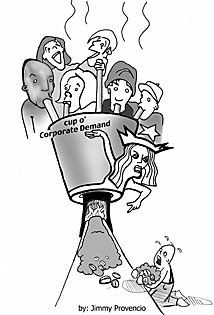
Illustration by Jimmy Provencio
|
By Jessica Lee
Arizona Daily Wildcat
Tuesday September 10, 2002
Oh, the sweet aroma of coffee? If you are drinking a cup of joe, a foamy cappuccino, iced mocha or a vanilla skinny latte freeze: Stop.
Chances are that the coffee beans that made your $2 - $5 drink have been grown in conditions in which the local farmers are getting completely ripped off.
Now is the time to think globally ÷ what do you support when you consume coffee?
There are an estimated 25 million coffee farmers worldwide, the majority on small-scale farms. Approximately 6.3 million metric tons of coffee is produced a year. Beans are then roasted, mixed and brewed. Throw in a shot of chocolate, a tad of milk, a packet of sugar and ta-da! There is the drink in your hand ÷ one of the 3,300 cups of coffee that are consumed each second worldwide.
In order to supply the universal demand for the morning jive, many farmers have not only stopped growing their traditional crops, but many have cut down the natural flora in order to maximize area and sunlight for the coffee plant. This has led not only to habitat loss, but has caused the farmer to be dependent on the powerful coffee buyer.
And the coffee buyer is paying them jack.
In some instances, a farmer might make just about $8,000 in a year, while his produce capitalized $750,000 in a first-world country. This incited humanitarian organizations to start the "Fair Trade" coffee movement. It is a certification process that proves to the consumer that the coffee buyer paid the farmer a fair and livable price.
Unable to sustain themselves by low international coffee prices, many farmers have to give up and turn to other forms of income such as cannabis or poppy seeds. Others try to make it to the United States illegally in hopes of a better life. On May 29, 2001, fourteen Mexican migrants were found dead in the scalding southern Arizona desert ÷ six of them were small coffee farmers from Veracruz, Mexico's second-largest coffee producing state.
Starbucks Coffee is one of the largest buyers of raw coffee beans. On Sept. 6, the corporation opened their first chain coffee shop at the Hotel Maria Isabel Sheraton in Mexico City.
Protesters did not let the grand opening go unnoticed. Ronnie Cummins, director of the Organic Consumers Association in the United States, expressed frustration as reported in El Universial. "It is another American corporation. They say they do the right thing, but it isn't true. They try to come off as being socially responsible. But their actions are very different than their words."
Starbucks' false greening campaign begs to differ. In their "Commitment to OriginsØ" brochure (which can be picked up at the Starbucks on East University Avenue), Starbucks claims: "It is our pledge to always provide the highest-quality coffee while contributing to the social, economic and environmental sustainability of coffee production. It's part of Starbucks' mission, and the foundation for our involvement in coffee-origin countries."
Chris Treter, staff member of the Organic Consumers Association, was sent to investigate Mexico's coffee crisis in 2000. Treter found that it is a "lie" that Starbucks intends to pay fair trade prices for all their coffee, which they develop as a marketing strategy throughout the world in order to give the company a "better image." Rather, only 1 percent of Starbucks coffee is Fair Trade.
Treter stated, "Coffee producers from Chiapas and Oaxaca live in a state of misery while the company promotes that they help to improve their situation." That one percent is sold as bagged whole coffee beans. Out of the over one hundred espresso drinks Starbucks makes, zero are made with Fair Trade coffee.
Starbucks is not the only one to blame. It is the local coffee shops such as Cafˇ Paraiso, Common Grounds Espresso Co., Bentley's House of Coffee and Tea, Coffee Etc., Coffee X Change, Blu Cafˇ, Cuppuccinos, Epic Cafˇ, Cup Cafˇ, Chocolate Iguana and Java Jive that are also at fault.
It is time to stop drinking social and environmental injustices. I urge you to protest any local place, especially Starbucks, that does not brew Fair Trade coffee. Coffee shop owners: Write a letter to the editor if you make all your drinks with Fair Trade coffee, so we students can stop drinking tea.
If we want to aid the millions of farmers across the world who live in a state of caffeinated poverty, we must act on a daily basis. Consume only Fair Trade coffee.

